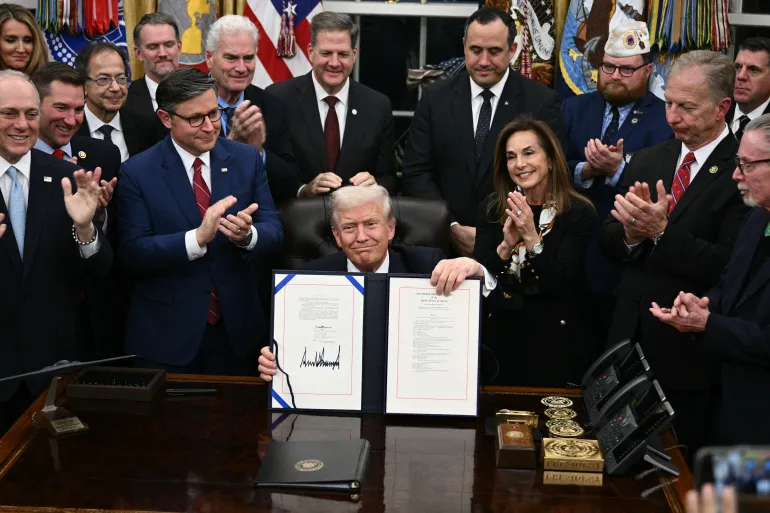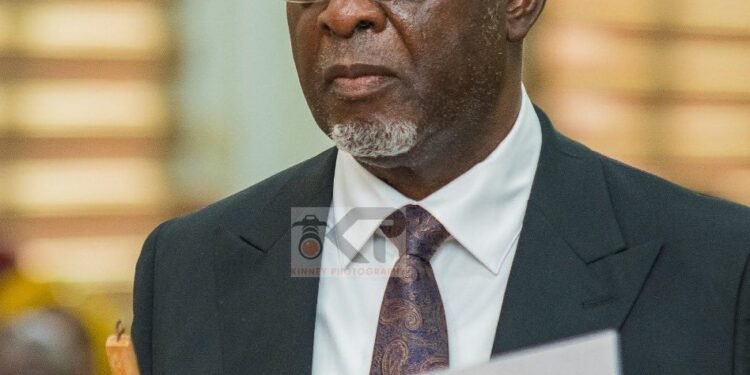US President Donald Trump has signed a federal government spending bill, bringing an end to the longest government shutdown in US history.
The final approval came less than two hours after the House of Representatives voted 222 to 209 to pass the deal struck between Republicans and centrist Senate Democrats that keeps the government running through January and ensures some key agencies will be funded for the remainder of fiscal year 2026.
The agreement, which ended a record stalemate in Congress, will also reverse the mass federal layoffs carried out by Trump during the shutdown. It paves the way for paychecks to flow to government employees, as well as the resumption of critical food and nutrition services relied on by tens of millions of Americans.
Trump said, “With my signature, the federal government will now resume normal operations,” pledging to work to lower the cost of living.

Trump cast the legislation as a victory over Democrats, calling it “a clear message that we will never give in to extortion, because that’s what it was, they tried to extort.” “They didn’t want to do it the easy way,” he said from the Oval Office, attacking what he called “the extremists” in the Democratic Party. “They had to do it the hard way, and they look very bad,” he added.
The White House signing ceremony was attended by a range of Republican lawmakers and capped a four-day sprint to pass the funding bill, after eight Senate Democrats broke ranks to compromise with Republicans amid worries about the shutdown’s widening economic consequences.
The deal guarantees an early December vote in the Senate on the expiring Obamacare subsidies that Democrats made the focus of their demands during the shutdown fight. However, a vote to extend the subsidies is unlikely to succeed, a likelihood that’s driven intense blowback across the Democratic Party.
Most congressional Democrats loudly protested the bill in the run-up to the House vote over concerns Americans’ health care premiums will skyrocket without the subsidies, with only six House Democrats voting in favor of the package.
Top House Democrat Hakeem Jeffries said ahead of the vote, “This fight is not over. We’re just getting started.” “Tens of millions of Americans are at risk of being unable to afford to go see a doctor when they need it,” he added.
The House Democrats who voted in favor of the compromise bill to reopen the government were Reps. Jared Golden, Adam Gray, Marie Gluesenkamp Perez, Henry Cuellar, Tom Suozzi and Don Davis. GOP Reps. Thomas Massie voted and Greg Steube against the bill.
Trump’s signature brings to an end to the shutdown that began on October 1, during which all but essential government services had ground to a halt.
Federal workers will now return to their jobs as early as Thursday, but it is unclear how quickly full government services and operations will resume. About 670,000 civil servants were furloughed during the closure, while a similar number worked without compensation, but will now receive back pay.
The shutdown’s end offers hope that services crucial to the country’s beleaguered air travel industry, in particular, will have time to recover before the Thanksgiving holiday travel wave, which is just two weeks away.
Restoration of food aid to millions of American families before Christmas may also make room in household budgets for increased spending during the festive season.
The end of the government shutdown will usher in a frenetic few weeks of work for the House, which has been largely shuttered since late September. As part of the GOP’s pressure campaign on Democrats, Johnson had decided to keep all members out of Washington until Senate Democrats agreed to back the GOP’s existing funding plan.Now, Republicans and Democrats have just four weeks in session before the end of the year — when those Obamacare tax credits expire. Trump has called for revamping the law rather than extending the existing subsidies, setting up a high-stakes showdown over health care that could carry political ramifications for next year’s midterm elections.
But there are plenty of other deadlines, including Congress’ farm bill and a slew of expiring energy credits.
House Republicans are also eager to pass as many spending bills as possible to improve their negotiating stance with the Senate ahead of that next deadline on January 30.
READ ALSO: Bank of Ghana Moves to Demystify FX Market with Transparent Auction-Based System





















